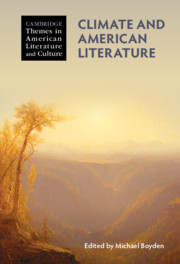Book contents
- Climate and American Literature
- Cambridge Themes in American Literature and Culture
- Climate and American Literature
- Copyright page
- Contents
- Figures
- Contributors
- Acknowledgments
- Introduction
- Part I Climate and Its Discontents
- Part II American Literary Climates
- Part III New Lines of Inquiry
- Chapter 16 Climate and the Environmental Humanities
- Chapter 17 The Anthropocenic Sublime
- Chapter 18 Climate and the New Materialisms
- Chapter 19 A Match Made in Hell
- Bibliography
- Index
Chapter 17 - The Anthropocenic Sublime
A Critique
from Part III - New Lines of Inquiry
Published online by Cambridge University Press: 18 February 2021
- Climate and American Literature
- Cambridge Themes in American Literature and Culture
- Climate and American Literature
- Copyright page
- Contents
- Figures
- Contributors
- Acknowledgments
- Introduction
- Part I Climate and Its Discontents
- Part II American Literary Climates
- Part III New Lines of Inquiry
- Chapter 16 Climate and the Environmental Humanities
- Chapter 17 The Anthropocenic Sublime
- Chapter 18 Climate and the New Materialisms
- Chapter 19 A Match Made in Hell
- Bibliography
- Index
Summary
The ascendancy of new materialist theory in the humanities since the turn of the century parallels the rise of anthropogenic climate change as a central political concern. This is not a coincidence: climate change exposes the limitations of both social constructivism and scientific realism. This essay examines the new materialist approaches to climate change proposed by Bruno Latour, Astrid Neimanis, and Rachel Walker Loewen. In Latour’s account, the categorical distinction between nature and culture has prevented climate science from openly embracing the political task of assembling a new polity encompassing both human and nonhuman entities. Neimanis and Walker Loewen, on the other hand, argue that the abstract quality of climate science is the principal reason for society’s failure to respond to anthropogenic climate change, and suggest that it must be reconceived in terms of concrete entanglements between human and nonhuman bodies. In placing their emphasis on embodied experience, however, both approaches fail to account for the rhetorical frames and the larger dynamics of communication that shape how climate change becomes socially relevant.
Keywords
- Type
- Chapter
- Information
- Climate and American Literature , pp. 288 - 299Publisher: Cambridge University PressPrint publication year: 2021
- 1
- Cited by

